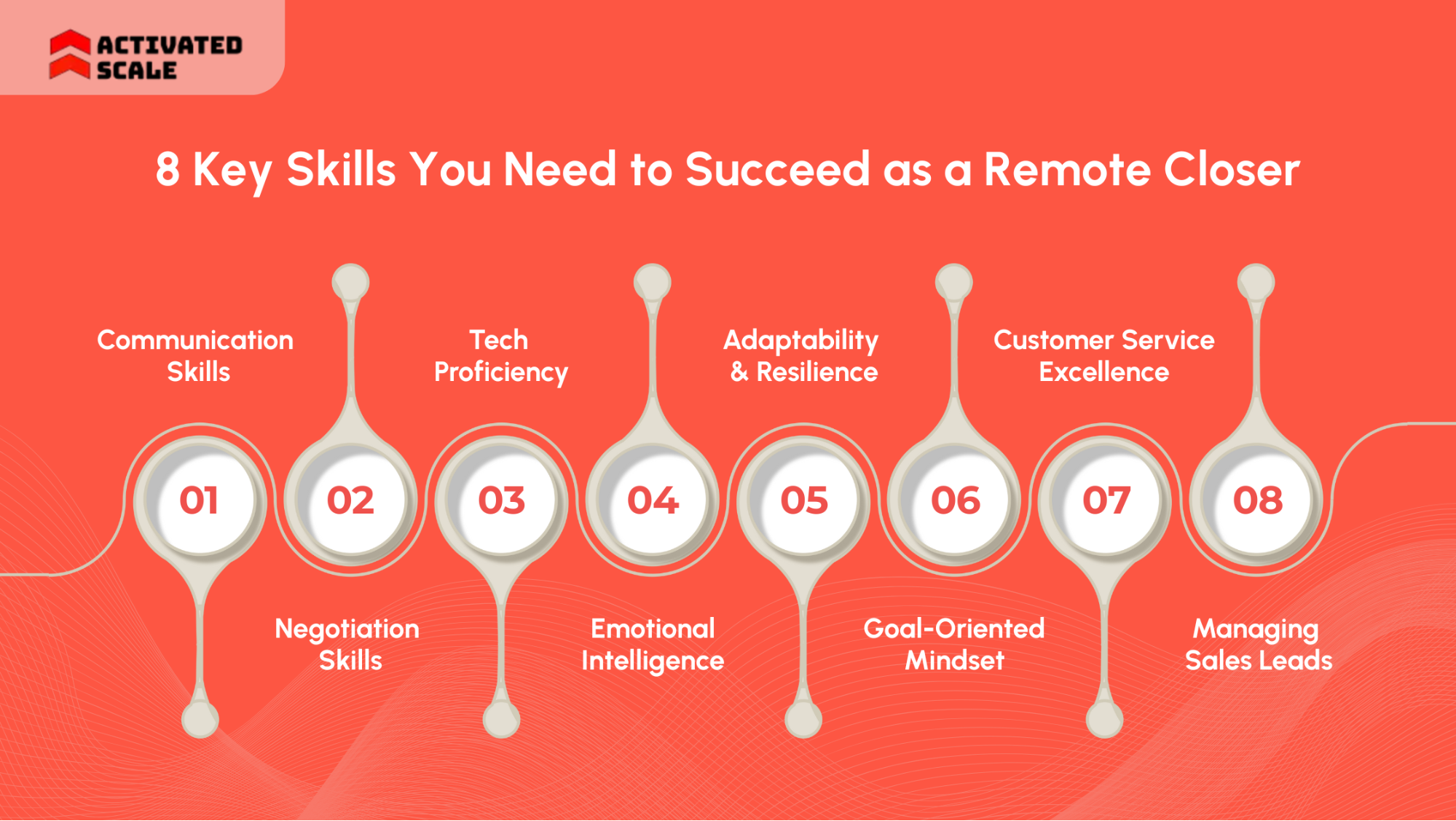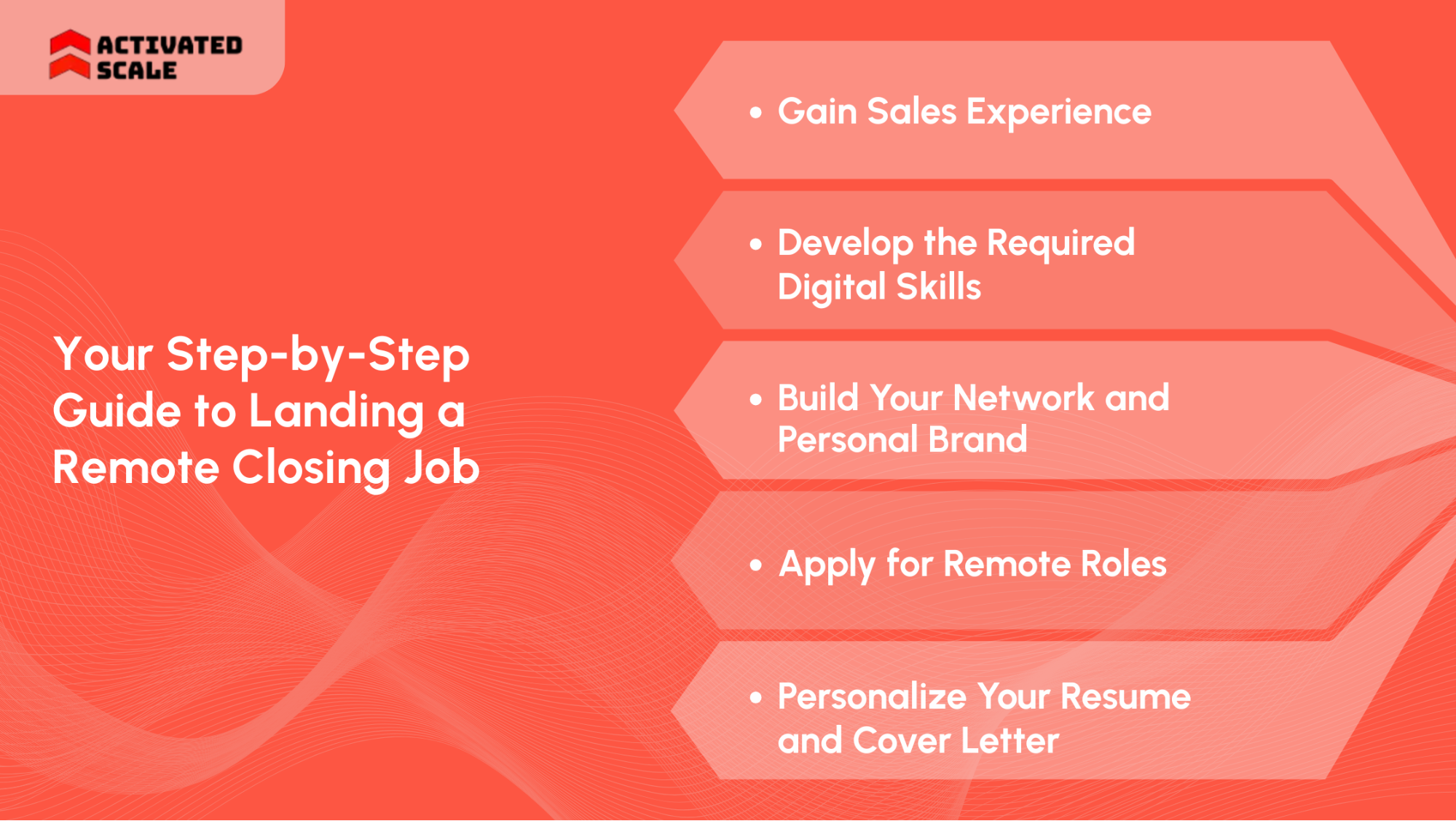After COVID-19, remote work has become the norm. The future of sales is remote. In 2025, over 32 million Americans (22% of the workforce) will be untethered from a traditional office.
Don't just adapt, lead the change by building a team that closes deals from anywhere. As more companies embrace virtual sales teams, remote closers are in high demand.
For sales professionals, this trend offers an exciting opportunity to finalize deals without being tied to an office or in-person meetings. If you’re tired of long commutes or limitations, what's the first step in this journey?
In this blog, we’ll break down what remote closing jobs entail, the skills you need, and how to succeed in this growing field.
Quick Glance
- Remote closing jobs offer flexibility and the potential for high earnings.
- Sales experience can be gained through entry-level positions or internships.
- Key skills include communication, negotiation, emotional intelligence, and adaptability.
- Start by building a network, attending workshops, and customizing your resume for remote positions.
- Use job boards like Activated Scale to find remote sales roles.
- Essential tools include CRM software, video conferencing tools, and e-signature platforms.
- The average salary for a remote closer is $112,891 per year.
What is a Remote Closing Job?
Remote closing jobs focus on the final stages of the sales process, securing a deal remotely. As a remote closer, you'll guide the customer through final negotiations and work to finalize the transaction.
Typically, you can use digital tools like video calls, emails, and e-signatures. It’s important to note that remote closers are not the same as setters.
While a setter’s job is to identify leads, schedule meetings, and warm up potential customers, a closer is responsible for finalizing the deal.
In industries like SaaS, real estate, and finance, remote closers are in demand for their ability to drive sales and close deals from anywhere.
The remote closing role is now clearly defined. So, what's next? It's all about building your personal skill set. Because without those, you will be half-ready for getting started.
Also Read: Sales Sequence for Successful Results
8 Key Skills You Need to Succeed as a Remote Closer

Look, anyone can learn a script. But excelling as a remote closer? That's a different game. You're building enough trust through a screen to get a "yes" when you can't even read the room in person.
It's part psychology, part discipline, and part mastering the tech that connects you. The average annual pay for a remote sales closer in the U.S. is about $112,891.
So, to earn that money, here are the eight real skills you need to dominate in this role.
Let’s unpack the top skills you should hone:
1. Communication Skills
Strong verbal and written communication is crucial when you’re not face‑to‑face. You’ll need to clearly articulate value, respond quickly to prospects’ questions, and craft follow‑up messages that keep deals moving.
2. Negotiation Skills
Closing deals remotely involves navigating objections and securing commitment from afar. You’ll need to listen well, ask probing questions, present persuasive arguments, and guide prospects toward decision-making.
3. Tech Proficiency
You’ll rely on tools such as CRM systems, video‑conferencing platforms, and e‑signature software. Mastering these tools lets you stay organized, track your deals, and close efficiently.
4. Emotional Intelligence (EQ)
Remote closers must read subtle cues, build trust virtually, and adapt their tone and approach to each client. The value of emotional intelligence has soared over the three and a half decades, ever since psychologists Salovey and Mayer named it.
Actionably, you can enhance your EQ by practicing active listening and seeking feedback from mentors.
5. Adaptability and Resilience
In remote closing jobs, you’ll face shifting tools, changing client expectations, and different time zones. Adaptability is increasingly demanded in a work environment defined by change.
You can build resilience by setting personal KPIs, scheduling regular self‑reviews, and embracing learning when things don’t go as planned.
6. Goal-Oriented Mindset
Remote closers must be self-motivated and focused on achieving specific sales targets. A goal-oriented approach helps you stay on track, measure success, and adjust tactics as needed to meet or exceed sales quotas. Setting clear and realistic goals can keep you motivated and aligned with company objectives.
7. Customer Service Excellence
Though your primary role is to close deals, providing excellent customer service during and after the sales process is crucial. Remote closers must address client concerns, provide ongoing support, and ensure a positive experience. This builds long-term relationships and can turn one-time clients into repeat business.
8. Managing Sales Leads
Remote closers must be able to handle and nurture sales leads effectively. Understanding the sales funnel, qualifying leads, and following up on opportunities are key tasks. Sales leads should be treated strategically, with customized follow-ups to move them through the funnel and toward conversion.
The golden rule of outreach? Your first email is your most potent, with a low response rate, while subsequent messages see a significant decline.
Actionable Tip
Record your next sales call, review how you handled objections, and ask: Did I adapt my tone? Did I sense unspoken concerns? Then practise again next time with a colleague or mentor in a role‑play.
Are you ready for the remote sales job? Use Activated Scale's Job Portal to get remote contractual role based on your prference.
Alright, you've got the skill set. So, how do you turn this into a job? That makes you a valuable asset. You can now understand those skills and land the job.
Your Step-by-Step Guide to Landing a Remote Closing Job

First of all, you don't need to submit endless applications. Because landing a remote closing role is a strategic process.
So, what you need is a five-step guide that shows you exactly how to position yourself, stand out, and secure your offer. Here's what to do:
Step 1: Gain Sales Experience
To land a remote closing job, you first need to develop sales skills. This doesn’t mean you need to start as a remote closer right away. Begin with entry-level sales roles or internships where you can learn the basics of sales, customer interactions, and relationship-building.
Experience in sales environments will give you the confidence to handle objections, close deals, and understand the overall sales process.
Step 2: Develop the Required Digital Skills
Remote closers need a diverse skill set. Focus on improving your communication, negotiation, and emotional intelligence skills. Take online courses or attend workshops that teach remote sales strategies and lead generation.
The more proficient you become with digital skills, the better your chances of success.
- CRM Software: Customer Relationship Management (CRM) Software is vital for managing your sales pipeline. Tools like HubSpot and Salesforce allow remote closers to track leads and manage client relationships effectively. Familiarity with these platforms helps you stay organized and never miss a follow-up.
- E-Signature Tools: Closing deals remotely requires the ability to collect signatures digitally. DocuSign and Dropbox Sign are two popular e-signature tools that allow clients to sign contracts securely online. Mastering these tools ensures a closing process without the need for physical meetings.
- Video Conferencing Software: Video conferencing tools like Zoom, Google Meet, or Microsoft Teams are essential for conducting virtual meetings with prospects. As a remote closer, being comfortable with these platforms is key to building trust and closing deals remotely.
- Email Automation Tools: Using email automation tools like Mailchimp or Outreach helps remote closers streamline their communication and follow-ups with leads. These tools allow you to follow up automatically based on client responses.
- Task and Time Management Tools: Time management is crucial when working remotely. Tools like Trello and Asana can help you keep you on track and ensure no prospect or follow-up is overlooked.
Step 3: Build Your Network and Personal Brand
Networking is essential in the remote sales world. LinkedIn is a powerful tool for connecting with other sales professionals and potential employers. Join sales forums, attend virtual sales events, and actively engage with people in your industry.
Building your personal brand as a knowledgeable and approachable salesperson will make you stand out to recruiters and hiring managers.
Step 4: Apply for Remote Roles
Once you've gained experience and built your skills and network, start applying for remote closing jobs. Use job boards like Activated Scale's Jobs service, where many remote closing roles are posted.
Don't forget to use specific search terms like "remote closing" or "remote sales positions" to filter your results.
Step 5: Personalize Your Resume and Cover Letter
When applying, ensure that your resume and cover letter reflect your experience in sales, your proficiency with remote tools, and your ability to close deals virtually. Focus on your past sales performance and how it translates to remote work.
Highlight your experience with video conferencing, CRM systems, and your ability to manage sales leads remotely.
Bonus Tip: Participate in mock calls or shadow experienced remote closers to refine your skills. Real-world practice will help you gain confidence and better understand the nuances of remote sales.
Also Read: How to Implement Predictive Sales Analytics for Forecasting
Final Thoughts
Remote closing jobs are a powerful, sustainable career path for sales professionals seeking flexibility and higher earning potential. The shift towards remote work has permanently altered how sales teams operate, and the opportunity for remote closers is only growing.
As businesses increasingly adopt remote sales models, now is the perfect time to position yourself as a top remote closer. The future is remote, and your next big career opportunity might be just a few clicks away.
Looking to start your career as a remote closer? Activated Scale offers a job marketplace service to help you find the right opportunity. Find remote closers here!
FAQs
1. How much do remote closers make?
The average salary for a remote closer is around $112,891 per year, with hourly rates averaging $54 depending on experience, location, and industry.
2. Do I need previous sales experience to become a remote closer?
While having sales experience is helpful, entry-level positions and internships can provide the foundation for those looking to break into remote closing.
3. What tools do I need to succeed in a remote closing job?
Remote closers rely on CRM software, video conferencing tools, and e-signature platforms. Mastering these tools, like HubSpot, Zoom, and DocuSign, will boost productivity and performance.
4. How do I find remote closing jobs?
Remote closing jobs can be found on platforms like Activated Scale, LinkedIn, Indeed, FlexJobs, and Upwork. Use keywords like “remote sales” or “remote closer” to narrow your search.
The Ultimate Guide to Hiring a Salesperson!
Get the step-by-step guide to hiring, onboarding, and ensuring success!
_edi.png)




